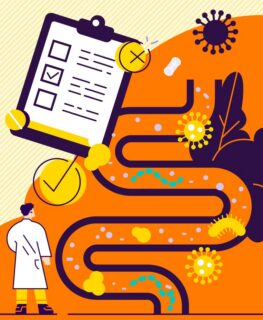Looking after your gut health does NOT have to be complicated, but it can be difficult when you’re surrounded by myths and aren’t sure what advice to follow.
It’s Love Your Gut Week and this year’s focus is on de-bunking gut health myths, to help make looking after your gut simpler, so here are the top 5 myths I hear daily and the actual science!
For more information, check out the Love Your Gut info pack here.
Myth: You need to cut out food groups to look after your gut.
The biggest myth about the gut is that you need to have a restrictive diet to look after it. All of the misinformation out there about cutting out foods for gut health can be very damaging. Generally speaking, you do not need to cut out gluten, dairy or coffee, or go vegan, for good gut health.
There is a subset of people who may have genuine intolerances to different components of foods, such as lactose (aka milk sugar). However, in these instances, it’s worth checking your tolerance level, as most people can still tolerate small amounts of lactose around 3g per sitting which is the equivalent of around 50mls of standard cow’s milk. Also, it’s worth noting that most hard cheeses are naturally very low in lactose and are therefore generally well-tolerated by even those who are extra sensitive to lactose.
Looking after your gut (and overall health) is all about inclusivity, moderation and getting plenty of plant diversity. Aim for 30 different plant-based foods across fruit, vegetables, wholegrains, legumes, nuts and seeds. It’s far more about what you include than what you exclude.
Myth: Bloating is all down to what we eat.
The truth is there is no single cause and there are many different triggers. Outside of conditions such as coeliac disease (an autoimmune condition where your body reacts to gluten) and food intolerances, I find it’s rarely the case that specific foods alone cause bloating. Stress, wearing tight clothes all day and lack of movement are common contributors – as well as HOW we eat. Before cutting out foods that are perfectly good for you because an online article said lentils or apples were the ‘biggest culprits’, there are a bunch of simple things you can do to ease the bloat. These include checking for common food intolerances such as lactose intolerance (I cover how you can safely and effectively do this at home in my book Eat Yourself Healthy), splitting your food intake into smaller meals, chewing well, avoiding tight clothes and rewiring the gut:brain axis. If you are experiencing persistent bloating, it is worth mentioning to your GP who can test you for other conditions, such as coeliac disease.
Rest assured the occasional bloat is totally normal, especially after a heavy meal or extra fibre. In fact, a little bit of bloating after a high fibre meal is a good thing! It means your inner community of microbes are well-fed and doing their job.
Myth: Apple cider vinegar can cure digestive problems.
Despite the claims, as far as the science goes, studies are pretty minimal. There is no clinical evidence that suggests Apple Cider Vinegar is beneficial for digestion, in fact it may trigger heartburn and reflux in some people. There is a little bit of evidence for vinegar in general (and not exclusive to ACV) to help regulate appetite and lower your blood sugar response if you’re having a high carb meal, like pasta, particularly if you have type 2 diabetes. In some vinegars that haven’t been pasteurized (i.e. heated at high temperatures), there is also some bacteria… but you’ll also find millions of bacteria in your humble apple. In terms of digestion, our stomach naturally produces acid that is much stronger than ACV and human studies do not support the claims that it helps you digest food better.
Myth: You need a colon cleanse for good gut health and to ‘get rid of toxins’.
There is no scientific evidence to suggest any health benefits of colon cleanses. While it’s true your body is faced with common toxins every day, rest assured the professionals (aka your liver, kidneys and other organs) are constantly working to keep you healthy. As many of these ‘cleanses’ are done in private clinics, they’re not well regulated and could also lead to side effects in some people, such as stomach pain, bloating, and other gut issues – or even more severely, dehydration, infection (it may wash out some of your good bacteria too) and punctured bowel.
If you want to look after your body so it’s well-equipped for its own detoxification, focus on eating a varied diet rich in fibre and plant-based goodness, and take it easy on the alcohol. No fancy or expensive procedures or ‘detoxes’ needed! That way, your detoxifying organs can work magic (the science-based kind) of their own. If constipation is your trouble check out the evidence-based tips in Eat Yourself Healthy & Love Your Gut.
Myth: Food intolerance tests will help diagnose my gut issues.
Unfortunately, scientists are yet to develop a suitable test for diagnosing food intolerances (with a breath test for lactose intolerance being the one exception). Despite this, a number of invalid tests have emerged selling nothing but pseudoscience, lacking both scientific evidence and clinical relevance.
There are no valid food intolerance or ‘sensitivity’ tests, apart from a specific breath test for lactose. Some of the common invalid tests to watch out for include IgG tests, hair analysis, eye analysis (iridology) and muscle analysis (kinesiology). The IgG test, for example, involves exposing a sample of your blood to a wide range of different foods and the resulting antibody (IgG) is measured, which the test claims is a marker of “intolerance”. It might sound legitimate, but the issue is, most of us will actually develop IgG antibodies to food during our lifetime, without getting symptoms. Instead of being a sign of “intolerance”, IgG is an indicator of repeated exposure, not clinical symptoms.
While we’re definitely heading towards more personalised nutrition, the science isn’t there yet. Instead, as a dietitian, I follow a systematic process that I call the 3R process (Record, Restrict and Reintroduce) to determine what might be causing your symptoms.
Full disclosure: this post is part of a sponsored partnership with Love Your Gut to de-bunk gut health misinformation – and I’m all about busting myths!














